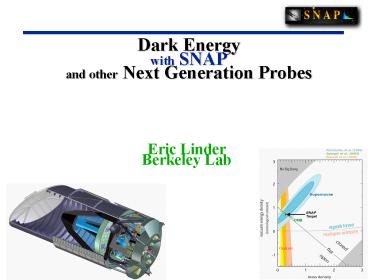Dark Energy - PowerPoint PPT Presentation
Title:
Dark Energy
Description:
Time variation w' is a critical clue to fundamental physics. Deep surveys of galaxies and SN to z 1. Large ... Corasaniti & Copeland 2002. w(a) = w0 wa(1-a) ... – PowerPoint PPT presentation
Number of Views:26
Avg rating:3.0/5.0
Title: Dark Energy
1
Dark Energy with SNAP and other Next Generation
Probes
Eric Linder Berkeley Lab
2
Dark Energy to z gt 1
Time variation w is a critical clue to
fundamental physics.
- Deep surveys of galaxies and SN to zgt1
- Large scale structure formation
- CMB constraints from zlss1100
New parametrization w(a)w0wa (1-a)
Linder 2002 PRL astro-ph/0208512
- Model independent, 2D phase space
- Well behaved at high z
- More accurate reconstruction
- More sensitive to data!
3
Evolving Equation of State
Linder 2002, astro-ph/0210217 following
Corasaniti Copeland 2002
w(a) w0wa(1-a) Accurate to 3 in EOS back to
z1.7 (vs. 27 for w1). Accurate to 0.2 in
distance back to zlss1100!
4
SN CMB Complementarity
SNAP tightly constrains dark energy models.
SNAPPlanck have excellent complementarity,
equal to a prior ?(?M)?0.01. Frieman, Huterer,
Linder, Turner 2002 SNAPPlanck can detect
time variation w at 99 cl (e.g.
SUGRA).
5
Large Scale Structure
Next generation galaxy survey 2dF ? 400dF !
Pilot Study with KAOS
Linder, Colless
KAOS Kilo-Aperture Optical Spectrometer Next
generation 2dF survey Gemini South front end (8
meter) 4000 fibers, 1.5 sq.deg. FOV 400 sq.deg.
area, 106 galaxies
6
Cosmic Shear Test
Alcock Paczynski 1979
Linder astro-ph/0212301
Transverse and radial distances are not
equal, even for a sphere, because they
are measured at different a(t). ?z /
?? H(z) ?dz/H(z)
SNAP still offers the best hope to detect w.
7
KAOSSNAP Baryon Oscillations
Eisenstein astro-ph/0301623
Linder astro-ph/0304001
Standard ruler ratio of wiggle scale to sound
horizon ? H(z) / (?mh2)1/2 Just like CMB
simple, linear physics
8
Growth of Structure
Growth in linear perturbation theory with w
- vs. cosmological constant
- vs. constant w
- vs. constant w degenerate in CMB
Linder 2002
9
Large Scale Structure
Growth predicted to be very sensitive to
w Running blind SZ, cluster/halo counts,
lensing Need full scale LSS simulations with w,
w None exist!
running!
- but in planning with C. Frenk, A. Jenkins
- vs. cosmological constant
- vs. constant w
- vs. constant w degenerate in CMB
10
First Simulation Results
- 107 particles
- Lbox648 Mpc/h
- ?M0.3 SUGRA DE
- Linear Pk as Hubble LCDM
- Fits Jenkins mass function
- Agrees with Hubble FOF(b0.2) to 5
Jenkins Linder 2003
11
Expansion History of the Universe
SNAP will map the expansion history, uncovering
physics just like the thermal history revealed
early universe physics.
12
Present Day Inflation
SNAP will map the expansion history precisely and
see the transition from acceleration to
deceleration.
13
Beyond Dark Energy
SNAP can not only determine dark energy
parameters, but test the cosmology framework
alternative gravitation, higher dimensions, etc.
14
History constrains Fate
Collapsing universe (e.g. axion DE)
SNAP will bound the possible fate of the
universe. Axion, supergravity, decaying dark
energy models leading to collapse of universe
have detectable w.
Work in progress, with Kallosh,
Kratochvil, Linde
15
SNAP Complements SNAP
Weak Lensing
SN Ia
SN II
Strong Lensing
Clusters
Baryon Oscillations
- Wide, Deep and Colorful
- 9000 times the area of Hubble Deep Field
- 15 sq.deg. to AB mag R30 120 epochs
- 300 sq.deg. to AB mag R28
16
Next Generation Resource
- For Cosmologists
- Mapping the expansion history of the universe
through the - accelerating phase back into the decelerating
epoch - Precision determination of cosmological
parameters
- For Astronomers
- SNAP main survey will be 5000x larger (and as
deep) - than the biggest HST deep survey, the ACS
survey - Complementary to NGST target selection for rare
objects - Can survey 300 sq. deg. in a year to J28 (AB
mag) - Archive data distributed
- Guest Survey Program
- For Fundamental Physicists
- Exploring the nature of dark energy
- Testing higher dimension theories
- Testing alternate theories of gravitation































